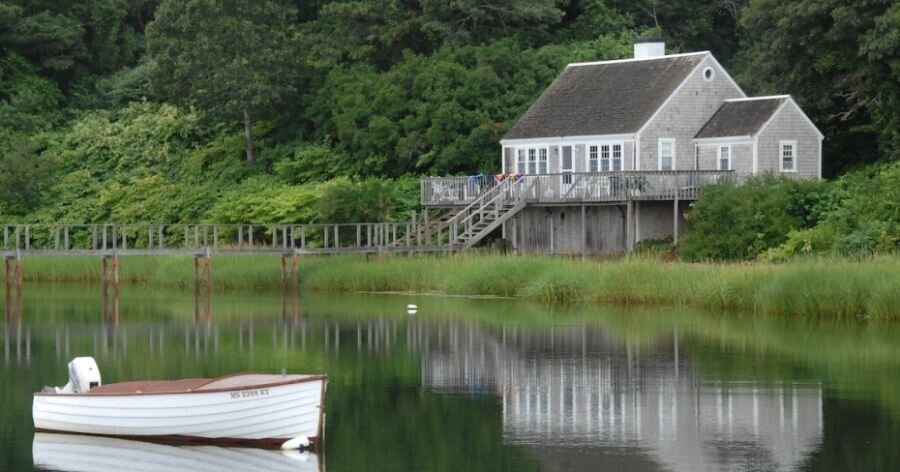What Housing Boom? Cottage Sales Stuck in the Doldrums
By: Thomas Sigsworth on June 18, 2014
Canadians just don’t seem to be buying cottages like they used to. New spring sales numbers show a recreational property market that isn’t participating in the broader housing boom – in fact, by some measures, it’s a market in decline, and new CMHC regulations could hamper activity further.
Weak Spring, So-So Five Years
The spring selling season – traditionally the time when cottages change hands as eager buyers gear up for summer – has been exceedingly slow this year, just as it was in 2013. Cottage sales in the benchmark Muskoka/Haliburton/Orillia area fell 18 percent year-over-year in April, and that decline follows a 28 percent drop in sales the previous year.
Cottage-country realtors like Steven Curry, of Forest Hill Real Estate in Muskoka, are seeing the lack of demand for recreational properties first-hand. In an interview with the Globe and Mail last week, Curry said slow sales are finally resulting in price reductions.
“Prices are down,” said Curry. “We have not seen any increases in prices as far as I’m concerned. Prices are probably down around 2004 levels.”
It’s a one-hundred-and-eighty degree turn from a decade ago, when recreational property prices were on fire, outpacing even the healthy gains seen on principal residences. During the go-go years from 2002 to 2007, Canadians were snapping up cottages hand-over-fist as a strong economy and a ‘real estate only goes up’ mindset made second properties seem like a fun, safe investment.
That all changed in 2008, when the financial crisis plunged much of the world into recession. While Canadian housing avoided the bust that occurred south of the border, the recreational property market took a big hit, with unit sales collapsing more than 50 percent and prices dipping 10 percent. Suddenly, cottages were out of favour as consumers moved to shore up their finances and reduce debt.
Even though the residential property market quickly resumed it’s upward advance, cottages never seemed to regain their luster in the same way.
CMHC Changes No Friend To Cottage Sales
The market for recreational properties isn’t getting any help from the CMHC either – the government insurer announced in April it would no longer insure second homes as part of its ongoing effort to reduce its mortgage footprint. The new regulations, which took effect May 30th, may weaken cottage demand even further as Canadians find it harder to get financing.
Chorus of Factors Weighing Down Cottage Market
So what’s behind the slumping cottage market? Experts point to a variety of factors, all of which have probably had some impact:
(1)Bad Weather. Ontario agents in particular blame a recent string of harsh winters and dreary spring months for the weakness seen in cottage sales.
Steven Curry says this year was particularly bad:
“We had a ridiculously long winter that just didn’t want to let go. When there’s snow on the ground in Toronto, nobody’s calling real estate agents up here and saying ‘let’s go look for properties.’ And there was a lot of damage done because of the snow, it took a while for the roads to open up.”
(2)Competition From U.S. Vacation Homes. After the U.S. housing bust, recreational properties in states like Florida, Arizona and Nevada became cheap relative to their cottage-country counterparts, and state-side competition became even stiffer once the loonie approached parity.
(3)Gas Prices. The days of 60 cent gas are long gone. With gas nearing $1.40 a liter, 2 and 3 hour commutes to cottage country are starting to seriously bite into the budgets of middle class Canadians.
(4)Higher Financing Costs. Because cottages can take a long time to sell, financing them is often more expensive than on a primary residence, with lenders requiring shorter amortization periods and charging higher interest rates.
(5)Higher House Prices. Although it seems counter intuitive, higher home prices may actually be hurting the cottage market as 30 and 40 somethings– the demographic most likely to buy a traditional cottage – contend with the whopping mortgages and huge downpayments needed to purchase their primary residences.
(6)The New Sharing Economy. Sharing is in and ownership – at least when it comes to ancillary items like cars and vacation homes – is out. With new peer-to-peer rental services like Airbnb springing up, many Canadians are opting to simply rent a cottage for a week or two from someone else. And the peer-to-peer rental economy looks set to expand further as technology continues to make it easier for people to share stuff – which may further erode cottage sales.
Of course, none of these factors will matter as much if the economy really takes off – the one thing recreational property markets need more than anything else is consumer confidence. People really only splurge on big, discretionary purchases like cottages when they feel good about their jobs and the broader economy. In a way, sluggish cottage sales could be sending a message about the broader Canadian economy – perhaps it is not as strong as it looks.
.jpg?itok=SnQQgxS0)

.jpg?itok=TXI5MWwl)